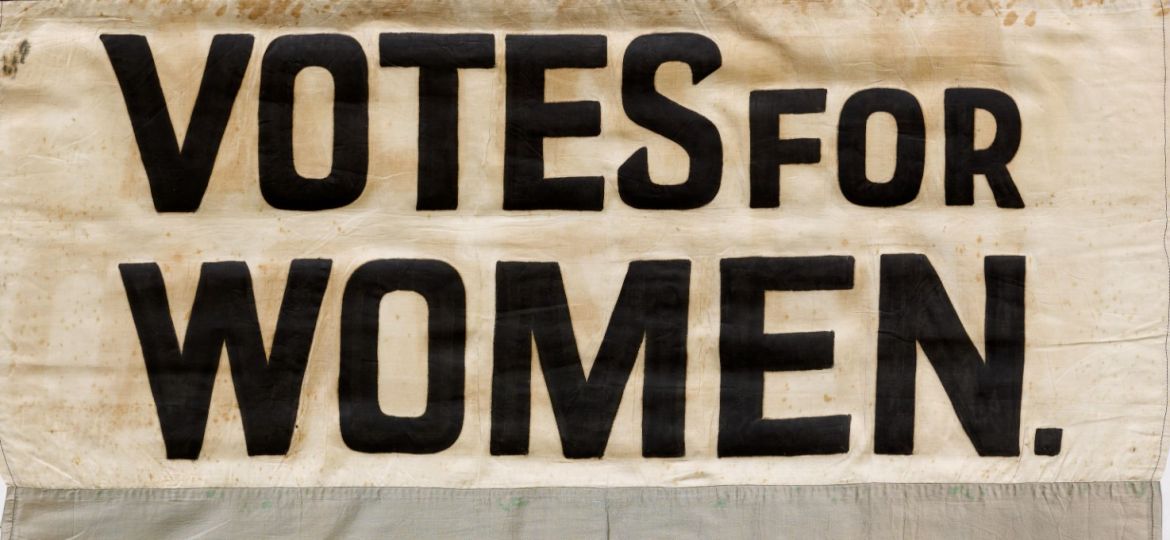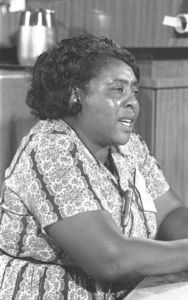
Editor’s note: Author Tamara Winfrey-Harris gave this speech in November 2019 during the Ain’t I A Woman? The Evolution of Women in Politics event at the Indianapolis Propylaeum.
In 1848, the first-ever women’s rights convention was held at Seneca Falls. The gathering, in the words of Frederick Douglass, put forward “the grand movement for attaining the civil, social, political, and religious rights of women.”
“The history of mankind is a history of repeated injuries and usurpation on the part of man toward woman, having in direct object the establishment of an absolute tyranny over her. To prove this, let facts be submitted to a candid world,” Elizabeth Cady Stanton would demand.
Her words were exhilarating. At Seneca Falls, Stanton and her compatriots planted the seed for women’s suffrage. But I need you to remember something else, as you celebrate Stanton and her suffragette sisters—Susan B. Anthony, Lucretia Mott, and Lucy Stone. And as you mark how, 100 years ago in 1920, the United States government deemed it unconstitutional to deny a citizen the right to vote on the basis of sex.
I need you to remember that on August 31, 1962, a 45-year-old woman—another suffragette of sorts—walked into a courthouse to register to vote. That woman was first told she had to explain to the registrar the meaning of the term “de facto” laws.
“I knowed (sic) as much about a facto law as a horse knows about Christmas Day,” she later said.
Her registration was rejected. She was also fired from her job and had to flee her home.
On September 10, she was shot at 16 times in the driveway of the friend’s house where she was seeking sanctuary.
On December 4, she went to the courthouse again and was given a literacy test. She did not pass but told the registrar he would see her every 30 days until she did.
On January 10, she did pass! She was registered to vote. But she sadly learned that didn’t matter. She would need two poll tax receipts. So, she paid the required fees.
Later that year, the woman, who had been working to help other men and women to exercise their constitutional rights, was arrested on a manufactured charge at a roadside cafe. In a holding room at the jail, police ordered other inmates to hold her down and beat her with a blackjack. Her dress was pulled above her shoulders and she was groped repeatedly. She nearly died and would never fully recover.
Before you celebrate that women received the right to vote in 1920, I need you to remember that not all women are white. Some women are Black like me.

I need you to remember Fannie Lou Hamer, an African-American woman who, more than 40 years after the 19th Amendment was passed, could not vote, but almost died trying.
I need you to remember that she founded the Mississippi Freedom Democratic Party and the National Women’s Political Caucus and advocated for the political power all women, regardless of race, can hold as a voting bloc. She said, “A white mother is no different from a Black mother. The only thing is (white mothers) haven’t had as many problems. But we cry the same tears.”
I need you to remember Black women activists like Mary Church Terrell and Ida B. Wells who advocated for the rights of all women and men when many of their white suffragette contemporaries would not.
I need you to remember that not every woman has a spotless record. Women of color, in particular, are treated unfairly by law enforcement and the judicial system. And in many places throughout the country, women returning to society after incarceration are denied the right to vote. (Returning citizens can exercise their right to vote in Indiana.)
I need you to remember that not every woman is middle-class. And poor women of all races are too frequently disenfranchised from the voting process.
I need you to remember that not every woman is cisgender. And trans women frequently find their right to vote impeded. Their IDs are challenged and their attempts to perform their civic duty are blocked by people who misunderstand the law or are downright bigoted.
I need you to remember that not every American voter is valued. Indeed, even Elizabeth Cady Stanton, when faced with Black men receiving the vote before white women, penned a racist, epithet-laden tirade warning of “Black rapists” being given rights.
White women’s suffrage activists used an 1851 speech by Sojourner Truth—a formerly enslaved woman—to make the case for women’s right to vote, then ratcheted up their racism when that right drew closer to reality.
Still, today, thousands of Black and Brown women and their families are disempowered by gerrymandering and disenfranchised by ID laws and voter purging. And this deprivation of basic rights is on the rise. Fourteen states introduced new voting restrictions in advance of the 2016 Presidential Election, many of them, according to an MIT study, made possible by the “gutting” of the Voting Rights Act by the Supreme Court in 2013.
Now, I believe in honoring progress. One hundred years ago, with the passing of the 19th amendment, America made progress toward its goal of liberty and justice for all. Women, as a collective, made progress. But we cannot celebrate before the job is done—until ALL women can enjoy the unimpeded right to vote.
The best way to celebrate this year is to fight fearlessly for that achievement. Because, in the words of Fannie Lou Hamer, Freedom Fighter, activist, a suffragette decades after women’s suffrage was allegedly achieved, “Nobody’s free until everybody’s free.”

Tamara Winfrey-Harris is the Indianapolis-based author of the award-winning book, The Sisters Are Alright: Changing the Broken Narrative of Black Women in America (Berrett-Koehler Publishers, 2015), and the forthcoming Dear Black Girl: Letters from your Sisters on Stepping into your Power (Berrett-Koehler Publishers, 2021), available now for pre-order from booksellers including Amazon.



